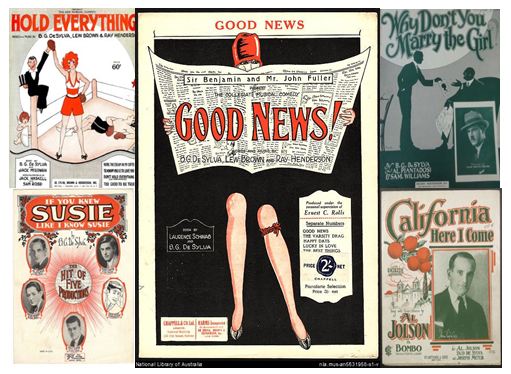 When Tin Pan Alley composer B.G. “Buddy” DeSylva co-composed such 1920’s hits as California Here I Come, Sonny Boy and If You Knew Susie (and lesser-known works such as Why Don’t You Marry the Girl?) he may have understood that he was leaving an indelible mark on American popular culture. But could he have possibly realized that he would leave an indelible mark on American legal culture by sleeping with his secretary? In fact, DeSylva’s adultery, and the legal consequences that flowed therefrom, were an important part of the reasoning in United States v. Windsor, the recent Supreme Court decision striking down the Defense of Marriage Act (DOMA).
When Tin Pan Alley composer B.G. “Buddy” DeSylva co-composed such 1920’s hits as California Here I Come, Sonny Boy and If You Knew Susie (and lesser-known works such as Why Don’t You Marry the Girl?) he may have understood that he was leaving an indelible mark on American popular culture. But could he have possibly realized that he would leave an indelible mark on American legal culture by sleeping with his secretary? In fact, DeSylva’s adultery, and the legal consequences that flowed therefrom, were an important part of the reasoning in United States v. Windsor, the recent Supreme Court decision striking down the Defense of Marriage Act (DOMA).
After making it big in music, DeSylva moved from New York to his native California, where he scored soundtracks, produced a slew of Shirley Temple films and worked as a studio executive . Anyone that busy needs a secretary, surely. In 1939, DeSylva (then 44) hired Marie Ballentine, who the newspapers at the time described as a 23 year-old “vivacious brunette.” Within months, DeSylva and Ballentine were having an affair and, in 1944, Ballentine gave birth to Stephen Ballentine. DeSylva stayed with his wife but acknowledged Stephen as his child. In 1950, DeSylva died of a heart attack, leaving his widow, his “illegitimate” son and a treasure trove of valuable copyrights that were just coming up for renewal. A court battle was inevitable.
According to the 1909 Copyright Act, which was in effect at the time, the right to renew the copyright of a deceased author fell to the author’s “widow, widower or children of the author.” DeSylva’s widow claimed that “children” meant only legitimate children, thus excluding Stephen. However, the Supreme Court disagreed in DeSylva v. Ballentine, 351 U.S. 570 (1956) Writing for the Court, Justice Harlan held that, since “there is no federal law of domestic relations, which is primarily a matter of state concern,” the court should defer to California law for the definition of “children.” Under California law, Stephen, because he had been acknowledged by his father, could inherit his father’s estate. Therefore, “children” in the Copyright Act included acknowledged illegitimate children, at least if they were from California.
Over half a century later, Justice Kennedy used the same logic to strike down DOMA. The State of New York recognized the same-sex marriage of Edith Windsor and Thea Spyer. Federal law, on the other hand, did not recognize the union because it was bound by DOMA’s more restrictive definitions of “marriage” and “spouse.” This resulted in a huge federal estate tax bill for Windsor when Spyer passed away, and she took her case all the way to the top. Citing the DeSylva opinion, the Supreme Court held that “because there is no federal law of domestic relations,” the federal government must defer to the states when defining marriage, even in the application of federal laws such as the tax code and the Copyright Act. DOMA purported to allow the federal government to ignore that deference and override New York’s domestic relations laws, so it could not stand.
When Spyer and Windsor first met in 1963, they danced the night away at a Greenwich Village restaurant. If Hollywood ever remakes their story into a feature film, it would only be fitting if, when they reenact this scene, a Buddy DeSylva tune is playing on the juke box.